Line Managers and Leaders in Employee Development: A UK Retail Study
VerifiedAdded on 2023/06/15
|48
|10860
|351
Report
AI Summary
This research project investigates the roles of line managers and leaders in employee development within the UK retail industry, focusing on Next plc. The study employs quantitative research methods, using questionnaires to gather data on the significance of talent management, the responsibilities of leaders and managers, and the impact on business performance. Key findings highlight the importance of leaders in guiding employees and managers in fostering talent development through training, motivation, and effective communication. The research concludes that talent management is crucial for organizational success, recommending increased focus on timely training and development initiatives. The report also includes a literature review, data analysis, conclusions, recommendations, and reflections on alternative research methodologies, providing a comprehensive overview of the topic.
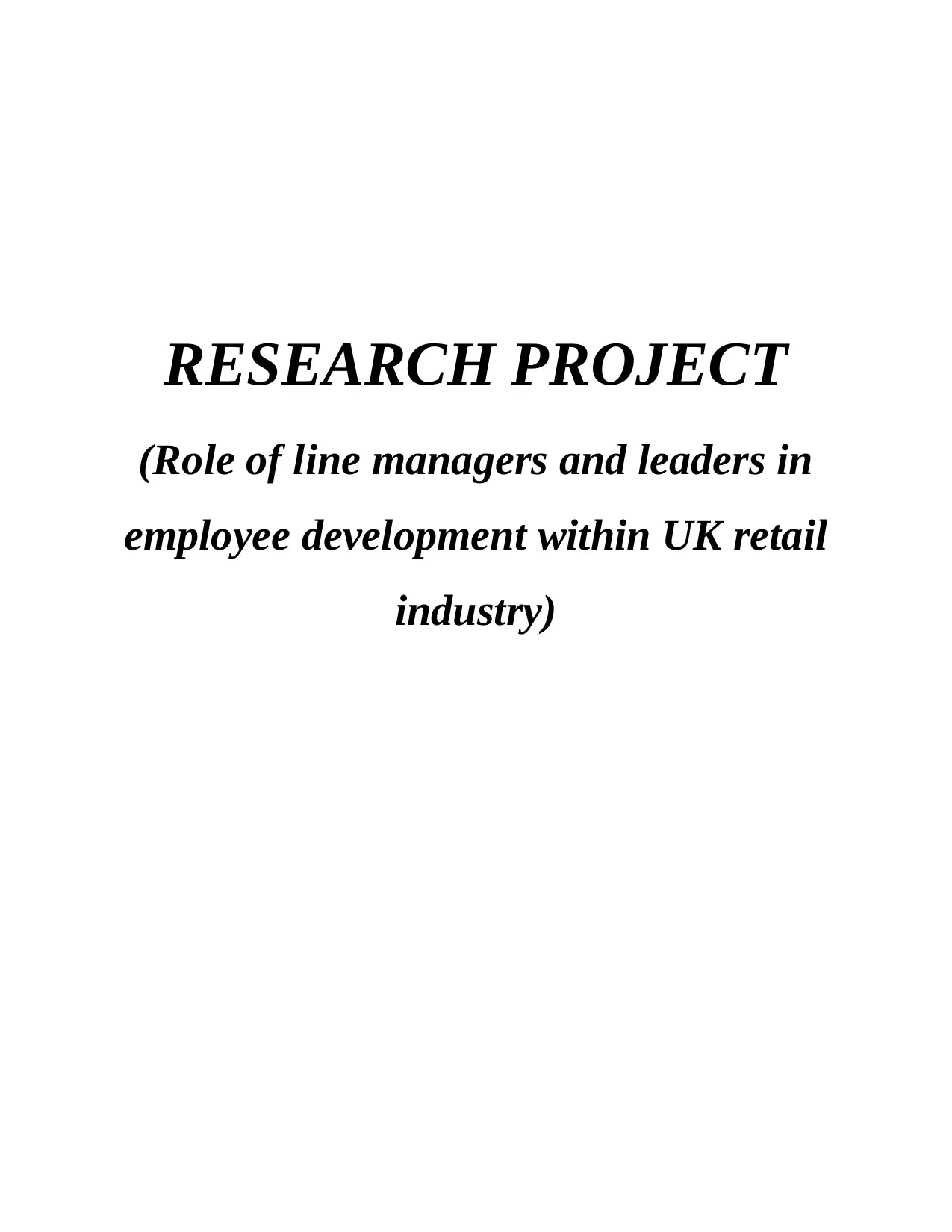
RESEARCH PROJECT
(Role of line managers and leaders in
employee development within UK retail
industry)
(Role of line managers and leaders in
employee development within UK retail
industry)
Paraphrase This Document
Need a fresh take? Get an instant paraphrase of this document with our AI Paraphraser
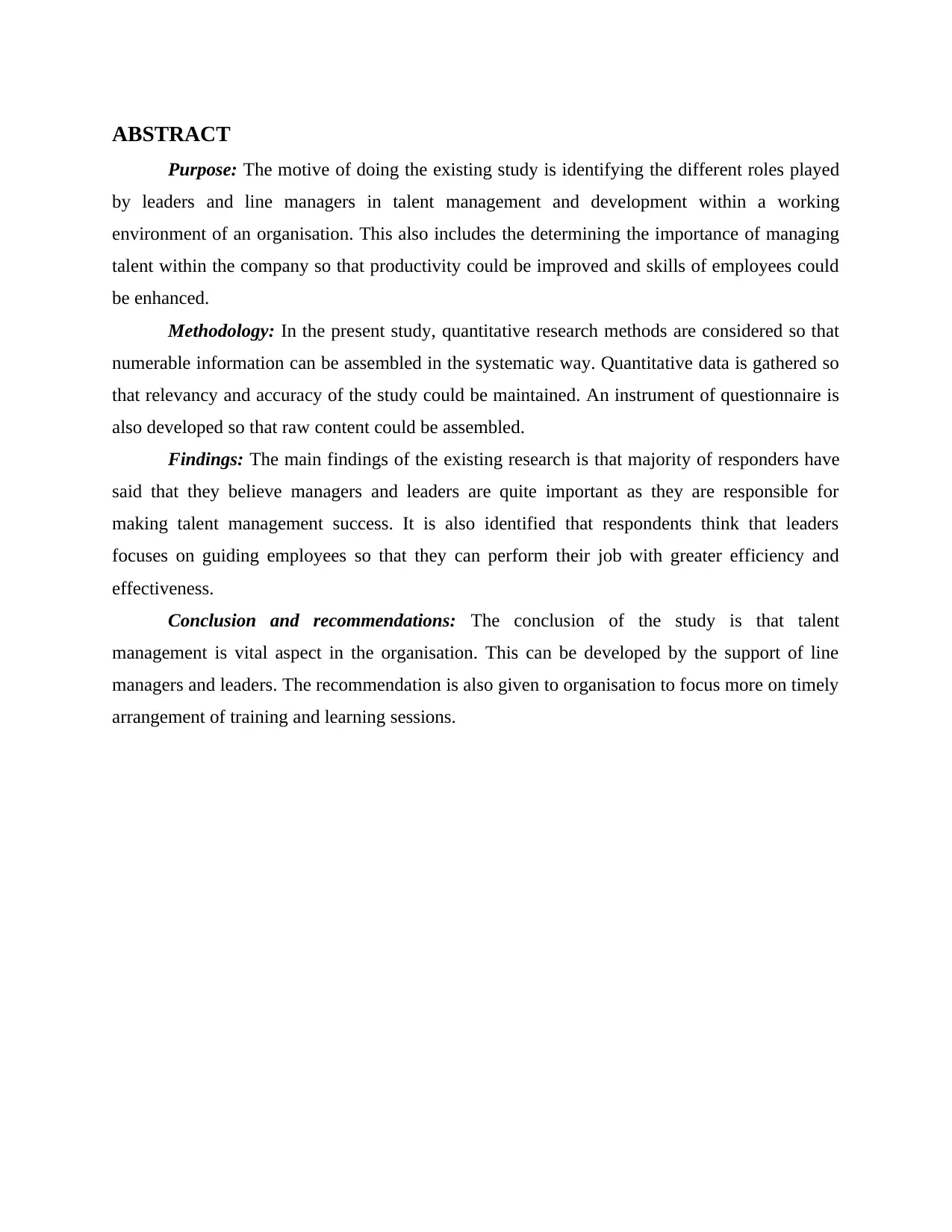
ABSTRACT
Purpose: The motive of doing the existing study is identifying the different roles played
by leaders and line managers in talent management and development within a working
environment of an organisation. This also includes the determining the importance of managing
talent within the company so that productivity could be improved and skills of employees could
be enhanced.
Methodology: In the present study, quantitative research methods are considered so that
numerable information can be assembled in the systematic way. Quantitative data is gathered so
that relevancy and accuracy of the study could be maintained. An instrument of questionnaire is
also developed so that raw content could be assembled.
Findings: The main findings of the existing research is that majority of responders have
said that they believe managers and leaders are quite important as they are responsible for
making talent management success. It is also identified that respondents think that leaders
focuses on guiding employees so that they can perform their job with greater efficiency and
effectiveness.
Conclusion and recommendations: The conclusion of the study is that talent
management is vital aspect in the organisation. This can be developed by the support of line
managers and leaders. The recommendation is also given to organisation to focus more on timely
arrangement of training and learning sessions.
Purpose: The motive of doing the existing study is identifying the different roles played
by leaders and line managers in talent management and development within a working
environment of an organisation. This also includes the determining the importance of managing
talent within the company so that productivity could be improved and skills of employees could
be enhanced.
Methodology: In the present study, quantitative research methods are considered so that
numerable information can be assembled in the systematic way. Quantitative data is gathered so
that relevancy and accuracy of the study could be maintained. An instrument of questionnaire is
also developed so that raw content could be assembled.
Findings: The main findings of the existing research is that majority of responders have
said that they believe managers and leaders are quite important as they are responsible for
making talent management success. It is also identified that respondents think that leaders
focuses on guiding employees so that they can perform their job with greater efficiency and
effectiveness.
Conclusion and recommendations: The conclusion of the study is that talent
management is vital aspect in the organisation. This can be developed by the support of line
managers and leaders. The recommendation is also given to organisation to focus more on timely
arrangement of training and learning sessions.
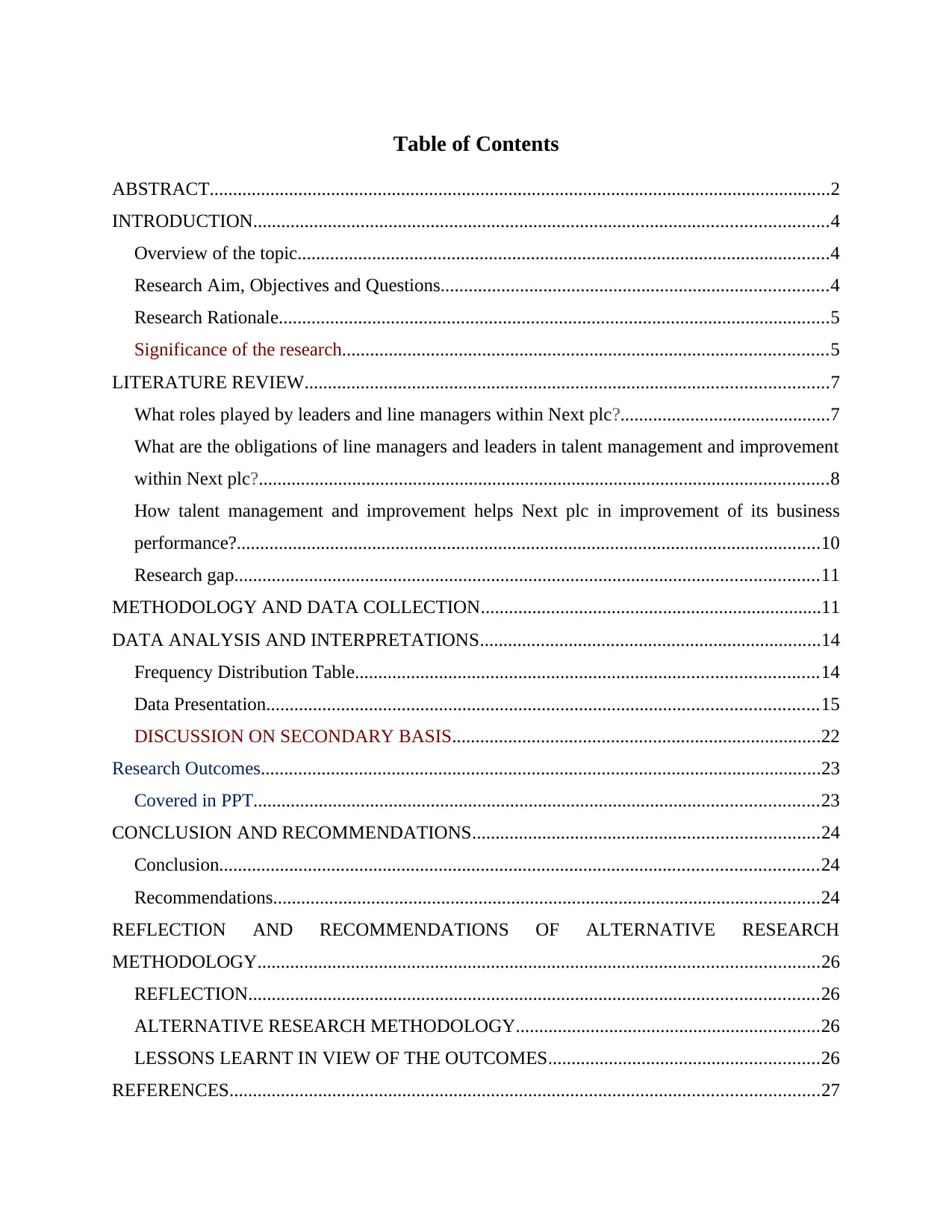
Table of Contents
ABSTRACT.....................................................................................................................................2
INTRODUCTION...........................................................................................................................4
Overview of the topic..................................................................................................................4
Research Aim, Objectives and Questions...................................................................................4
Research Rationale......................................................................................................................5
Significance of the research........................................................................................................5
LITERATURE REVIEW................................................................................................................7
What roles played by leaders and line managers within Next plc?.............................................7
What are the obligations of line managers and leaders in talent management and improvement
within Next plc?..........................................................................................................................8
How talent management and improvement helps Next plc in improvement of its business
performance?.............................................................................................................................10
Research gap.............................................................................................................................11
METHODOLOGY AND DATA COLLECTION.........................................................................11
DATA ANALYSIS AND INTERPRETATIONS.........................................................................14
Frequency Distribution Table...................................................................................................14
Data Presentation......................................................................................................................15
DISCUSSION ON SECONDARY BASIS...............................................................................22
Research Outcomes........................................................................................................................23
Covered in PPT.........................................................................................................................23
CONCLUSION AND RECOMMENDATIONS..........................................................................24
Conclusion................................................................................................................................24
Recommendations.....................................................................................................................24
REFLECTION AND RECOMMENDATIONS OF ALTERNATIVE RESEARCH
METHODOLOGY........................................................................................................................26
REFLECTION..........................................................................................................................26
ALTERNATIVE RESEARCH METHODOLOGY.................................................................26
LESSONS LEARNT IN VIEW OF THE OUTCOMES..........................................................26
REFERENCES..............................................................................................................................27
ABSTRACT.....................................................................................................................................2
INTRODUCTION...........................................................................................................................4
Overview of the topic..................................................................................................................4
Research Aim, Objectives and Questions...................................................................................4
Research Rationale......................................................................................................................5
Significance of the research........................................................................................................5
LITERATURE REVIEW................................................................................................................7
What roles played by leaders and line managers within Next plc?.............................................7
What are the obligations of line managers and leaders in talent management and improvement
within Next plc?..........................................................................................................................8
How talent management and improvement helps Next plc in improvement of its business
performance?.............................................................................................................................10
Research gap.............................................................................................................................11
METHODOLOGY AND DATA COLLECTION.........................................................................11
DATA ANALYSIS AND INTERPRETATIONS.........................................................................14
Frequency Distribution Table...................................................................................................14
Data Presentation......................................................................................................................15
DISCUSSION ON SECONDARY BASIS...............................................................................22
Research Outcomes........................................................................................................................23
Covered in PPT.........................................................................................................................23
CONCLUSION AND RECOMMENDATIONS..........................................................................24
Conclusion................................................................................................................................24
Recommendations.....................................................................................................................24
REFLECTION AND RECOMMENDATIONS OF ALTERNATIVE RESEARCH
METHODOLOGY........................................................................................................................26
REFLECTION..........................................................................................................................26
ALTERNATIVE RESEARCH METHODOLOGY.................................................................26
LESSONS LEARNT IN VIEW OF THE OUTCOMES..........................................................26
REFERENCES..............................................................................................................................27
⊘ This is a preview!⊘
Do you want full access?
Subscribe today to unlock all pages.

Trusted by 1+ million students worldwide
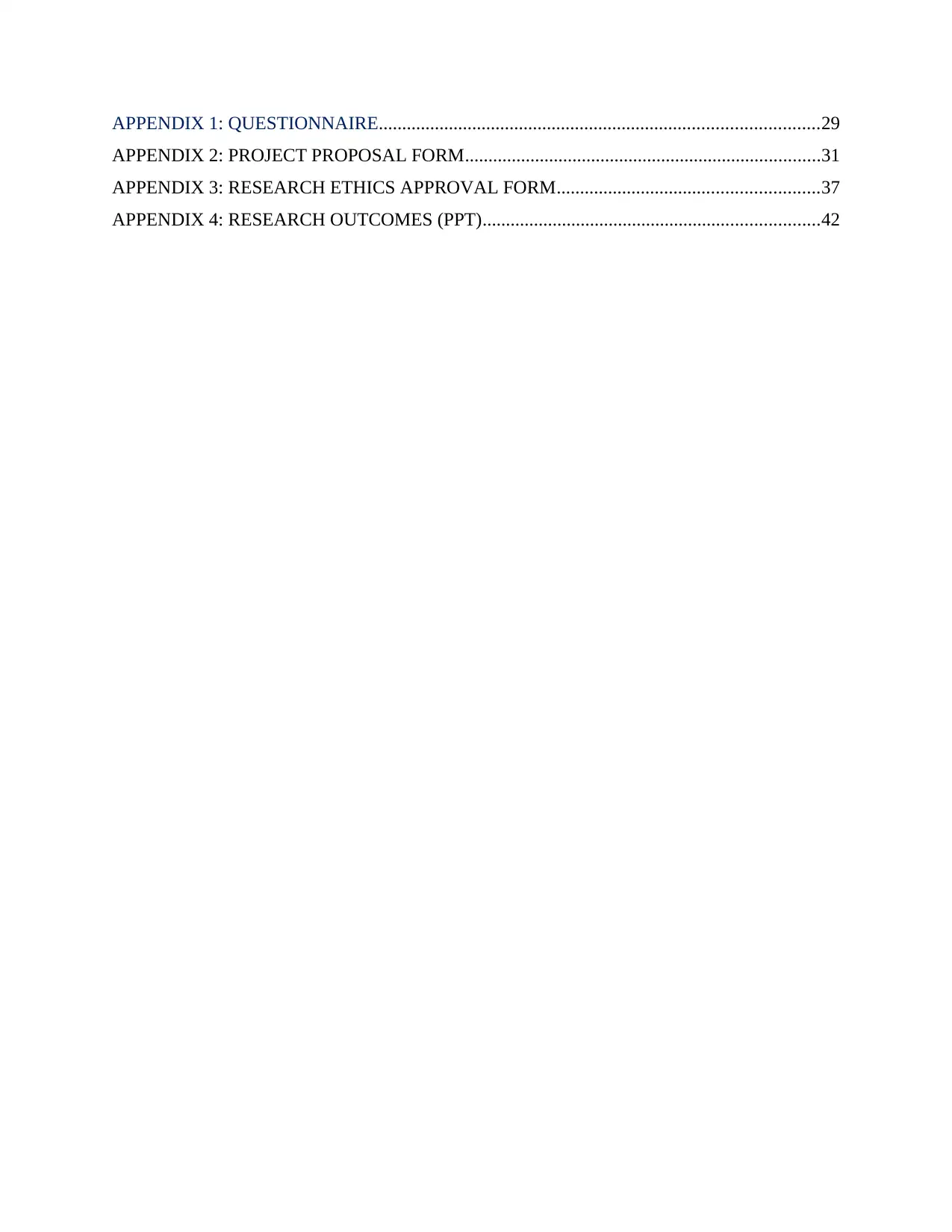
APPENDIX 1: QUESTIONNAIRE..............................................................................................29
APPENDIX 2: PROJECT PROPOSAL FORM............................................................................31
APPENDIX 3: RESEARCH ETHICS APPROVAL FORM........................................................37
APPENDIX 4: RESEARCH OUTCOMES (PPT)........................................................................42
APPENDIX 2: PROJECT PROPOSAL FORM............................................................................31
APPENDIX 3: RESEARCH ETHICS APPROVAL FORM........................................................37
APPENDIX 4: RESEARCH OUTCOMES (PPT)........................................................................42
Paraphrase This Document
Need a fresh take? Get an instant paraphrase of this document with our AI Paraphraser

INTRODUCTION
Overview of the topic
Employees are the individuals in an organisation who holds the responsibility of carrying
out activities and tasks within an organisation (Muhammed and Zaim, 2020). It is quite necessary
for company to focus on the management and development of its existing and new employees.
While recruiting employees, an organisation makes sure that it hires the best one from different
available candidates. These employees turn out be an asset for the company. It is a very well-
known fact that an organisation's most vital resource is its people and hence it is crucial that it
stays committed and loyal to them throughout (De Oliveira and et. al., 2019). Recruiting a
talented employee is quite significant what is more essential is the development of those talents.
Good talent management is a model that is considered by companies as one of their business
strategies. Talent management refers to the strategic management procedure including methods
for managing and upgrading the skill set of great potential employees for retaining them in a long
run and achieving the desired objectives of the company (Marescaux, De Winne and Forrier,
2019). This is the procedure which includes in-depth analysis and workforce planning for
identifying the gaps between the present and future skills needed and initiating development and
growth strategies to retain and train personnel through career development and growth. In the
present investigation, roles of line managers and leaders are identified for making positive
working environment and retaining employees in the workplace (Schermerhorn Jr, Bachrach and
Wright, 2020). The selected company for the existing research is Next Plc. It is a British
multinational footwear, home products and clothing retailer. The headquarters of the
organisation is located in Enderby, England.
Research Aim, Objectives and Questions
Research Aim
“To identify the roles played by leaders and line managers in talent management and
development within a working environment of an organisation”: A study on Next plc
Research Objectives
To determine the roles played by leaders and line managers within Next plc
To ascertain the responsibilities of line managers and leaders in talent management and
development within Next plc
Overview of the topic
Employees are the individuals in an organisation who holds the responsibility of carrying
out activities and tasks within an organisation (Muhammed and Zaim, 2020). It is quite necessary
for company to focus on the management and development of its existing and new employees.
While recruiting employees, an organisation makes sure that it hires the best one from different
available candidates. These employees turn out be an asset for the company. It is a very well-
known fact that an organisation's most vital resource is its people and hence it is crucial that it
stays committed and loyal to them throughout (De Oliveira and et. al., 2019). Recruiting a
talented employee is quite significant what is more essential is the development of those talents.
Good talent management is a model that is considered by companies as one of their business
strategies. Talent management refers to the strategic management procedure including methods
for managing and upgrading the skill set of great potential employees for retaining them in a long
run and achieving the desired objectives of the company (Marescaux, De Winne and Forrier,
2019). This is the procedure which includes in-depth analysis and workforce planning for
identifying the gaps between the present and future skills needed and initiating development and
growth strategies to retain and train personnel through career development and growth. In the
present investigation, roles of line managers and leaders are identified for making positive
working environment and retaining employees in the workplace (Schermerhorn Jr, Bachrach and
Wright, 2020). The selected company for the existing research is Next Plc. It is a British
multinational footwear, home products and clothing retailer. The headquarters of the
organisation is located in Enderby, England.
Research Aim, Objectives and Questions
Research Aim
“To identify the roles played by leaders and line managers in talent management and
development within a working environment of an organisation”: A study on Next plc
Research Objectives
To determine the roles played by leaders and line managers within Next plc
To ascertain the responsibilities of line managers and leaders in talent management and
development within Next plc
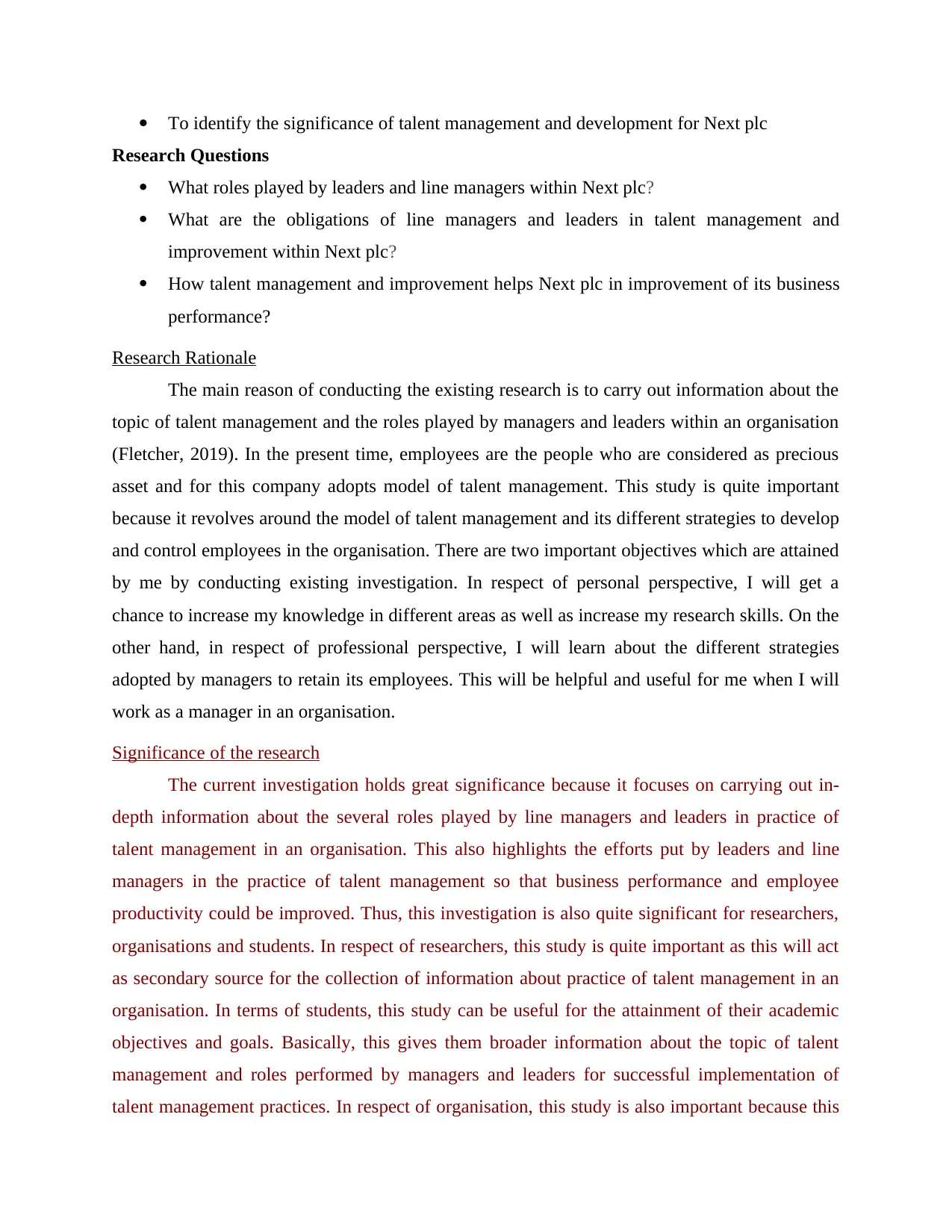
To identify the significance of talent management and development for Next plc
Research Questions
What roles played by leaders and line managers within Next plc?
What are the obligations of line managers and leaders in talent management and
improvement within Next plc?
How talent management and improvement helps Next plc in improvement of its business
performance?
Research Rationale
The main reason of conducting the existing research is to carry out information about the
topic of talent management and the roles played by managers and leaders within an organisation
(Fletcher, 2019). In the present time, employees are the people who are considered as precious
asset and for this company adopts model of talent management. This study is quite important
because it revolves around the model of talent management and its different strategies to develop
and control employees in the organisation. There are two important objectives which are attained
by me by conducting existing investigation. In respect of personal perspective, I will get a
chance to increase my knowledge in different areas as well as increase my research skills. On the
other hand, in respect of professional perspective, I will learn about the different strategies
adopted by managers to retain its employees. This will be helpful and useful for me when I will
work as a manager in an organisation.
Significance of the research
The current investigation holds great significance because it focuses on carrying out in-
depth information about the several roles played by line managers and leaders in practice of
talent management in an organisation. This also highlights the efforts put by leaders and line
managers in the practice of talent management so that business performance and employee
productivity could be improved. Thus, this investigation is also quite significant for researchers,
organisations and students. In respect of researchers, this study is quite important as this will act
as secondary source for the collection of information about practice of talent management in an
organisation. In terms of students, this study can be useful for the attainment of their academic
objectives and goals. Basically, this gives them broader information about the topic of talent
management and roles performed by managers and leaders for successful implementation of
talent management practices. In respect of organisation, this study is also important because this
Research Questions
What roles played by leaders and line managers within Next plc?
What are the obligations of line managers and leaders in talent management and
improvement within Next plc?
How talent management and improvement helps Next plc in improvement of its business
performance?
Research Rationale
The main reason of conducting the existing research is to carry out information about the
topic of talent management and the roles played by managers and leaders within an organisation
(Fletcher, 2019). In the present time, employees are the people who are considered as precious
asset and for this company adopts model of talent management. This study is quite important
because it revolves around the model of talent management and its different strategies to develop
and control employees in the organisation. There are two important objectives which are attained
by me by conducting existing investigation. In respect of personal perspective, I will get a
chance to increase my knowledge in different areas as well as increase my research skills. On the
other hand, in respect of professional perspective, I will learn about the different strategies
adopted by managers to retain its employees. This will be helpful and useful for me when I will
work as a manager in an organisation.
Significance of the research
The current investigation holds great significance because it focuses on carrying out in-
depth information about the several roles played by line managers and leaders in practice of
talent management in an organisation. This also highlights the efforts put by leaders and line
managers in the practice of talent management so that business performance and employee
productivity could be improved. Thus, this investigation is also quite significant for researchers,
organisations and students. In respect of researchers, this study is quite important as this will act
as secondary source for the collection of information about practice of talent management in an
organisation. In terms of students, this study can be useful for the attainment of their academic
objectives and goals. Basically, this gives them broader information about the topic of talent
management and roles performed by managers and leaders for successful implementation of
talent management practices. In respect of organisation, this study is also important because this
⊘ This is a preview!⊘
Do you want full access?
Subscribe today to unlock all pages.

Trusted by 1+ million students worldwide

gives information about the talent management strategies used by large-scale companies. Hence,
this investigation will provide great data about the talent management strategies that can be
adopted by small-scale companies. Therefore, this is the study which is quite significant for the
attainment of pre-defined aim and objectives of the research.
this investigation will provide great data about the talent management strategies that can be
adopted by small-scale companies. Therefore, this is the study which is quite significant for the
attainment of pre-defined aim and objectives of the research.
Paraphrase This Document
Need a fresh take? Get an instant paraphrase of this document with our AI Paraphraser
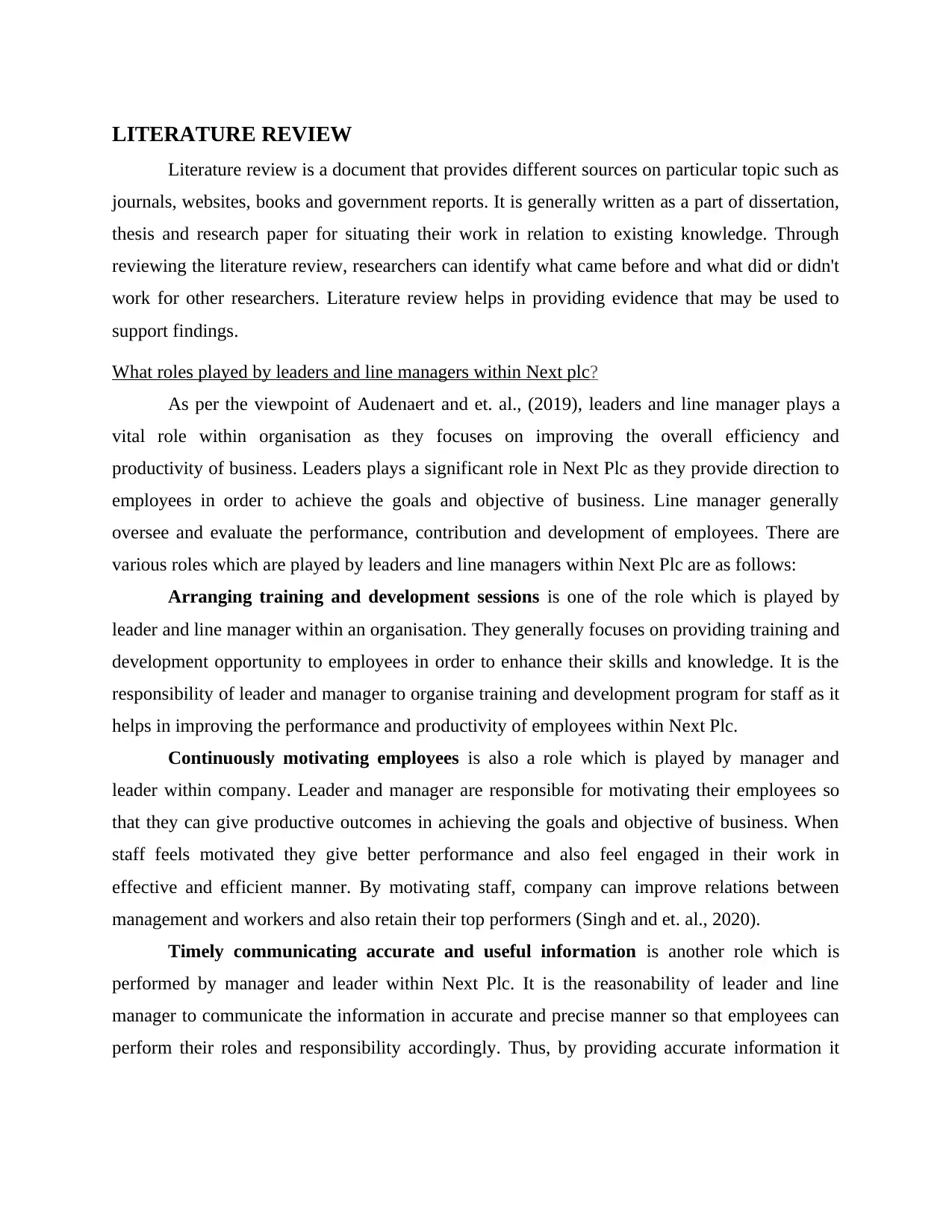
LITERATURE REVIEW
Literature review is a document that provides different sources on particular topic such as
journals, websites, books and government reports. It is generally written as a part of dissertation,
thesis and research paper for situating their work in relation to existing knowledge. Through
reviewing the literature review, researchers can identify what came before and what did or didn't
work for other researchers. Literature review helps in providing evidence that may be used to
support findings.
What roles played by leaders and line managers within Next plc?
As per the viewpoint of Audenaert and et. al., (2019), leaders and line manager plays a
vital role within organisation as they focuses on improving the overall efficiency and
productivity of business. Leaders plays a significant role in Next Plc as they provide direction to
employees in order to achieve the goals and objective of business. Line manager generally
oversee and evaluate the performance, contribution and development of employees. There are
various roles which are played by leaders and line managers within Next Plc are as follows:
Arranging training and development sessions is one of the role which is played by
leader and line manager within an organisation. They generally focuses on providing training and
development opportunity to employees in order to enhance their skills and knowledge. It is the
responsibility of leader and manager to organise training and development program for staff as it
helps in improving the performance and productivity of employees within Next Plc.
Continuously motivating employees is also a role which is played by manager and
leader within company. Leader and manager are responsible for motivating their employees so
that they can give productive outcomes in achieving the goals and objective of business. When
staff feels motivated they give better performance and also feel engaged in their work in
effective and efficient manner. By motivating staff, company can improve relations between
management and workers and also retain their top performers (Singh and et. al., 2020).
Timely communicating accurate and useful information is another role which is
performed by manager and leader within Next Plc. It is the reasonability of leader and line
manager to communicate the information in accurate and precise manner so that employees can
perform their roles and responsibility accordingly. Thus, by providing accurate information it
Literature review is a document that provides different sources on particular topic such as
journals, websites, books and government reports. It is generally written as a part of dissertation,
thesis and research paper for situating their work in relation to existing knowledge. Through
reviewing the literature review, researchers can identify what came before and what did or didn't
work for other researchers. Literature review helps in providing evidence that may be used to
support findings.
What roles played by leaders and line managers within Next plc?
As per the viewpoint of Audenaert and et. al., (2019), leaders and line manager plays a
vital role within organisation as they focuses on improving the overall efficiency and
productivity of business. Leaders plays a significant role in Next Plc as they provide direction to
employees in order to achieve the goals and objective of business. Line manager generally
oversee and evaluate the performance, contribution and development of employees. There are
various roles which are played by leaders and line managers within Next Plc are as follows:
Arranging training and development sessions is one of the role which is played by
leader and line manager within an organisation. They generally focuses on providing training and
development opportunity to employees in order to enhance their skills and knowledge. It is the
responsibility of leader and manager to organise training and development program for staff as it
helps in improving the performance and productivity of employees within Next Plc.
Continuously motivating employees is also a role which is played by manager and
leader within company. Leader and manager are responsible for motivating their employees so
that they can give productive outcomes in achieving the goals and objective of business. When
staff feels motivated they give better performance and also feel engaged in their work in
effective and efficient manner. By motivating staff, company can improve relations between
management and workers and also retain their top performers (Singh and et. al., 2020).
Timely communicating accurate and useful information is another role which is
performed by manager and leader within Next Plc. It is the reasonability of leader and line
manager to communicate the information in accurate and precise manner so that employees can
perform their roles and responsibility accordingly. Thus, by providing accurate information it

reduces the chances of miscommunication and misunderstanding due to which employees
accomplish their target in smooth and effective manner.
Managing time is a role which is played by manager and leader within a company. Line
manager and leader focuses on managing the time of employees so that they can meet the
deadlines of the task and accomplish their work in significant way. By managing time, line
manager and leader can reduce the stress of employees, improve focus, develop positive
reputation and also reach goals faster.
Offering rewards and appreciating workforce is also a role which is played by leader
and line manager within Next Plc. They generally improve the performance and efficiency of
employees by offering reward and appreciating them in workplace. By offering rewards,
company can increases the motivation and morale level of staff. Reward and appreciation also
helps in attracting top talent and also contributed to the well being of staff.
Maintaining & evaluating procedure is the significant role of line managers and leaders
in Next Plc. This includes keeping timely record of the performance of employees as well as
their attained objectives. It also involves the comparison of the outcomes and results of the
employees with their earlier performance so that difference or improvement could be carried out.
This process is also very beneficial at the time of appraisal and offering rewards to the
employees so that every employee can get relevant reward for their performance.
Recruiting, inducting and settling new staff is another important role of leaders and line
managers in an organisation. In this managers and leaders determine vacant job positions in the
company and then put advertisements for the same so that right number of candidate could apply
for the positions. After recruiting and selecting appropriate and relevant candidate, leaders fulfil
the vacant job position and play major role in attaining objectives of the organisation. After
recruiting employees, leaders and managers conduct induction sessions so that each employee
knows about each policy and principle of the company.
What are the obligations of line managers and leaders in talent management and improvement
within Next plc?
According to Figueroa and et. al., (2019), line manager and leader are also responsible for
managing talent management and improvement within Next plc. There are various
responsibilities of line manager and leader in talent management and improvement within
organisation they are as follows:
accomplish their target in smooth and effective manner.
Managing time is a role which is played by manager and leader within a company. Line
manager and leader focuses on managing the time of employees so that they can meet the
deadlines of the task and accomplish their work in significant way. By managing time, line
manager and leader can reduce the stress of employees, improve focus, develop positive
reputation and also reach goals faster.
Offering rewards and appreciating workforce is also a role which is played by leader
and line manager within Next Plc. They generally improve the performance and efficiency of
employees by offering reward and appreciating them in workplace. By offering rewards,
company can increases the motivation and morale level of staff. Reward and appreciation also
helps in attracting top talent and also contributed to the well being of staff.
Maintaining & evaluating procedure is the significant role of line managers and leaders
in Next Plc. This includes keeping timely record of the performance of employees as well as
their attained objectives. It also involves the comparison of the outcomes and results of the
employees with their earlier performance so that difference or improvement could be carried out.
This process is also very beneficial at the time of appraisal and offering rewards to the
employees so that every employee can get relevant reward for their performance.
Recruiting, inducting and settling new staff is another important role of leaders and line
managers in an organisation. In this managers and leaders determine vacant job positions in the
company and then put advertisements for the same so that right number of candidate could apply
for the positions. After recruiting and selecting appropriate and relevant candidate, leaders fulfil
the vacant job position and play major role in attaining objectives of the organisation. After
recruiting employees, leaders and managers conduct induction sessions so that each employee
knows about each policy and principle of the company.
What are the obligations of line managers and leaders in talent management and improvement
within Next plc?
According to Figueroa and et. al., (2019), line manager and leader are also responsible for
managing talent management and improvement within Next plc. There are various
responsibilities of line manager and leader in talent management and improvement within
organisation they are as follows:
⊘ This is a preview!⊘
Do you want full access?
Subscribe today to unlock all pages.

Trusted by 1+ million students worldwide

Developing flexible working environment is one of the responsibility of line manager
and leader within Next Plc. They generally focuses on developing flexible working environment
so that employees can work with dedication and give their better performance in achieving the
organisational goals and objective. Through developing flexible working environment, company
can attract top talents and also enhances the engagement level of staff due to which they
contribute their best efforts in order to make business successful.
Providing benefits and rewards is another responsibility of manager and leader within
organisation. They focuses on offering benefits and rewards to employees so that they can work
with dedication. Benefits and rewards helps in improving the engagement level of staff and also
creates positive workplace environment. By providing benefits and rewards, company can
increase the productivity of employees by making them feel appreciated (Singh and et. al., 2020).
Staffing and hiring is also a responsibility of line manager and leader in talent
management and improvement within Next Plc. They generally hire the best performers who
have potential to give better performance within Next Plc. The manager and leader of company
focuses on hiring talented employees by examining their qualification and experiences.
Supporting decision-making is a responsibility of line manager and leader in talent
management and improvement within Next Plc. They also focuses on supporting the decision
making of employees as it helps in increasing their participation level towards the brand. By
supporting the decision making process of employees, manager and leader increases their
motivation and productivity level.
Providing career development opportunities is the other significant responsibility of
leaders and line managers in the practice of talent management in Next Plc. Leaders and line
managers focus on determining the expectations of employees in relation to their future
development so that opportunities could be made in the workplace. This assists in offering
opportunities to employees so that they can grow and develop in their professional career. When
employees get opportunities related to career development then they perform their roles with
greater efficiency and effectiveness.
Arranging training and learning sessions is the other important responsibility of line
managers and leaders in the organisation because it is directly linked with the process of
improving skills and knowledge of employees. In this leaders and line managers identify the
and leader within Next Plc. They generally focuses on developing flexible working environment
so that employees can work with dedication and give their better performance in achieving the
organisational goals and objective. Through developing flexible working environment, company
can attract top talents and also enhances the engagement level of staff due to which they
contribute their best efforts in order to make business successful.
Providing benefits and rewards is another responsibility of manager and leader within
organisation. They focuses on offering benefits and rewards to employees so that they can work
with dedication. Benefits and rewards helps in improving the engagement level of staff and also
creates positive workplace environment. By providing benefits and rewards, company can
increase the productivity of employees by making them feel appreciated (Singh and et. al., 2020).
Staffing and hiring is also a responsibility of line manager and leader in talent
management and improvement within Next Plc. They generally hire the best performers who
have potential to give better performance within Next Plc. The manager and leader of company
focuses on hiring talented employees by examining their qualification and experiences.
Supporting decision-making is a responsibility of line manager and leader in talent
management and improvement within Next Plc. They also focuses on supporting the decision
making of employees as it helps in increasing their participation level towards the brand. By
supporting the decision making process of employees, manager and leader increases their
motivation and productivity level.
Providing career development opportunities is the other significant responsibility of
leaders and line managers in the practice of talent management in Next Plc. Leaders and line
managers focus on determining the expectations of employees in relation to their future
development so that opportunities could be made in the workplace. This assists in offering
opportunities to employees so that they can grow and develop in their professional career. When
employees get opportunities related to career development then they perform their roles with
greater efficiency and effectiveness.
Arranging training and learning sessions is the other important responsibility of line
managers and leaders in the organisation because it is directly linked with the process of
improving skills and knowledge of employees. In this leaders and line managers identify the
Paraphrase This Document
Need a fresh take? Get an instant paraphrase of this document with our AI Paraphraser
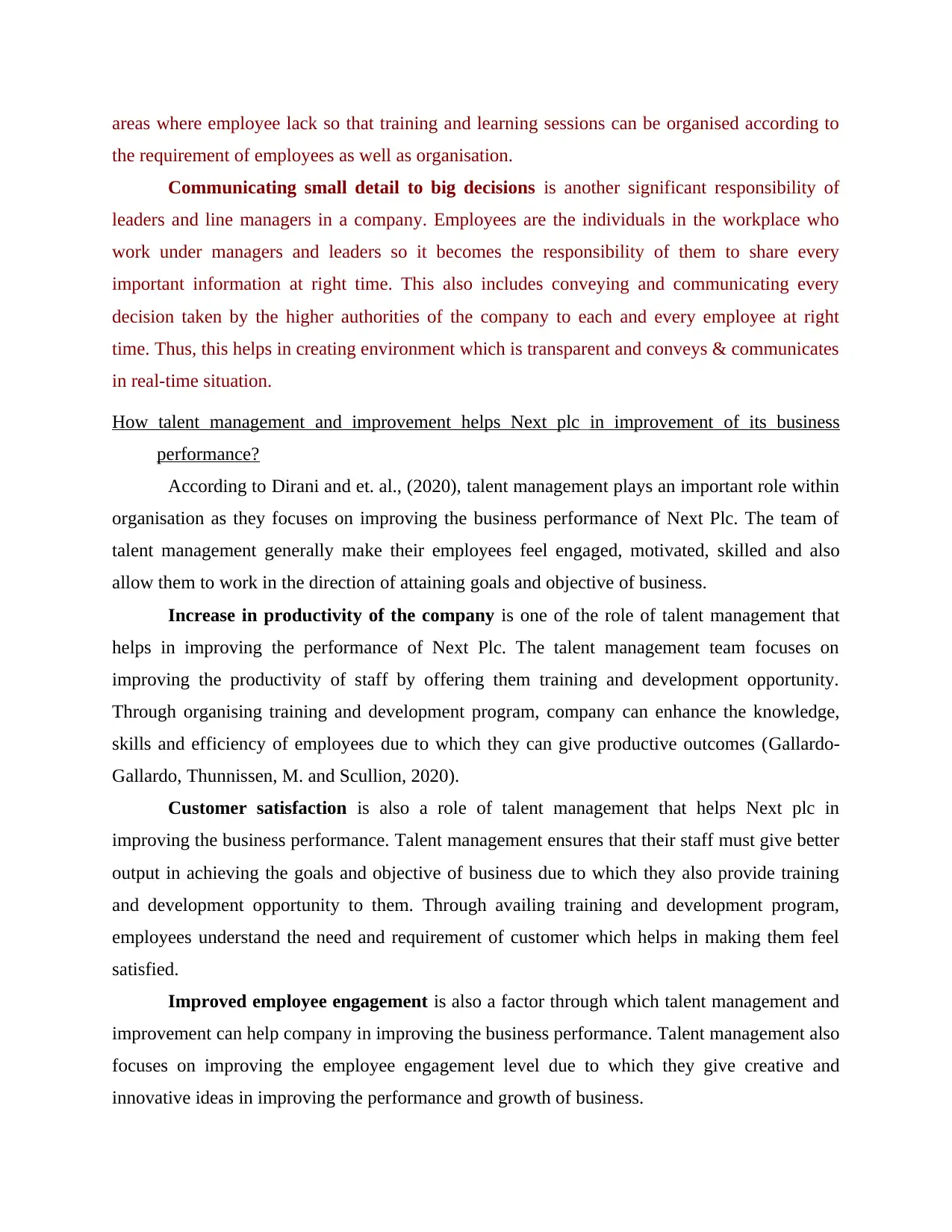
areas where employee lack so that training and learning sessions can be organised according to
the requirement of employees as well as organisation.
Communicating small detail to big decisions is another significant responsibility of
leaders and line managers in a company. Employees are the individuals in the workplace who
work under managers and leaders so it becomes the responsibility of them to share every
important information at right time. This also includes conveying and communicating every
decision taken by the higher authorities of the company to each and every employee at right
time. Thus, this helps in creating environment which is transparent and conveys & communicates
in real-time situation.
How talent management and improvement helps Next plc in improvement of its business
performance?
According to Dirani and et. al., (2020), talent management plays an important role within
organisation as they focuses on improving the business performance of Next Plc. The team of
talent management generally make their employees feel engaged, motivated, skilled and also
allow them to work in the direction of attaining goals and objective of business.
Increase in productivity of the company is one of the role of talent management that
helps in improving the performance of Next Plc. The talent management team focuses on
improving the productivity of staff by offering them training and development opportunity.
Through organising training and development program, company can enhance the knowledge,
skills and efficiency of employees due to which they can give productive outcomes (Gallardo-
Gallardo, Thunnissen, M. and Scullion, 2020).
Customer satisfaction is also a role of talent management that helps Next plc in
improving the business performance. Talent management ensures that their staff must give better
output in achieving the goals and objective of business due to which they also provide training
and development opportunity to them. Through availing training and development program,
employees understand the need and requirement of customer which helps in making them feel
satisfied.
Improved employee engagement is also a factor through which talent management and
improvement can help company in improving the business performance. Talent management also
focuses on improving the employee engagement level due to which they give creative and
innovative ideas in improving the performance and growth of business.
the requirement of employees as well as organisation.
Communicating small detail to big decisions is another significant responsibility of
leaders and line managers in a company. Employees are the individuals in the workplace who
work under managers and leaders so it becomes the responsibility of them to share every
important information at right time. This also includes conveying and communicating every
decision taken by the higher authorities of the company to each and every employee at right
time. Thus, this helps in creating environment which is transparent and conveys & communicates
in real-time situation.
How talent management and improvement helps Next plc in improvement of its business
performance?
According to Dirani and et. al., (2020), talent management plays an important role within
organisation as they focuses on improving the business performance of Next Plc. The team of
talent management generally make their employees feel engaged, motivated, skilled and also
allow them to work in the direction of attaining goals and objective of business.
Increase in productivity of the company is one of the role of talent management that
helps in improving the performance of Next Plc. The talent management team focuses on
improving the productivity of staff by offering them training and development opportunity.
Through organising training and development program, company can enhance the knowledge,
skills and efficiency of employees due to which they can give productive outcomes (Gallardo-
Gallardo, Thunnissen, M. and Scullion, 2020).
Customer satisfaction is also a role of talent management that helps Next plc in
improving the business performance. Talent management ensures that their staff must give better
output in achieving the goals and objective of business due to which they also provide training
and development opportunity to them. Through availing training and development program,
employees understand the need and requirement of customer which helps in making them feel
satisfied.
Improved employee engagement is also a factor through which talent management and
improvement can help company in improving the business performance. Talent management also
focuses on improving the employee engagement level due to which they give creative and
innovative ideas in improving the performance and growth of business.

Research gap
It is identified from the above mentioned literature review that there is a research gap i.e. lack of
information regarding roles played by leaders and line managers in talent management and
development within a working environment of an organisation. In previous studies, there was
lack of information about the roles of line managers and leaders in talent development. This is a
main gap that will be addressed within research report by using research questions.
METHODOLOGY AND DATA COLLECTION
Research methodology is a concept that focuses on gathering and analysing the data for
specific topic (Snyder, 2019). Through research methodology, researcher can exerted the overall
reliability of topic in effective and efficient manner.
Research approach:
Research approach is a detailed plan which is followed in research in order to understand
the research concepts in significant manner. There are mainly two types of research approach
such as deductive and inductive approach. The research approach is used by researcher for
collecting relevant information about the specific topic. In this research, researcher has chosen
deductive approach as it helps in evaluating the quantitative information within less time period.
The major benefit of using deductive approach is that it takes out the relevancy of gathered
numerical piece of information without consuming longer time period. This approach is quite
supportive with quantitative research in a systematic manner.
Research philosophy:
Research philosophy is a set of principles that covers the entire view of research. It is
divided into two forms such as positivism and interpretivism. In this research, the chosen
philosophy is positivism as it helps in collecting, evaluating and using quantitative data within
minimum cost and time period. Through using positivism philosophy, researcher can collect the
reliable information related research (Bloomfield and Fisher, 2019). The main advantage of the
positivism philosophy is that it facilitates in measuring accuracy of the assembled numerical
content in a systematic and proper way.
Research choice:
The research choice generally defines the area in which researcher choose the way of
collecting data (Hodge, 2020). Research choice is divided into two forms such as qualitative and
quantitative. Within this research quantitative research choice is chosen as it helps in providing
It is identified from the above mentioned literature review that there is a research gap i.e. lack of
information regarding roles played by leaders and line managers in talent management and
development within a working environment of an organisation. In previous studies, there was
lack of information about the roles of line managers and leaders in talent development. This is a
main gap that will be addressed within research report by using research questions.
METHODOLOGY AND DATA COLLECTION
Research methodology is a concept that focuses on gathering and analysing the data for
specific topic (Snyder, 2019). Through research methodology, researcher can exerted the overall
reliability of topic in effective and efficient manner.
Research approach:
Research approach is a detailed plan which is followed in research in order to understand
the research concepts in significant manner. There are mainly two types of research approach
such as deductive and inductive approach. The research approach is used by researcher for
collecting relevant information about the specific topic. In this research, researcher has chosen
deductive approach as it helps in evaluating the quantitative information within less time period.
The major benefit of using deductive approach is that it takes out the relevancy of gathered
numerical piece of information without consuming longer time period. This approach is quite
supportive with quantitative research in a systematic manner.
Research philosophy:
Research philosophy is a set of principles that covers the entire view of research. It is
divided into two forms such as positivism and interpretivism. In this research, the chosen
philosophy is positivism as it helps in collecting, evaluating and using quantitative data within
minimum cost and time period. Through using positivism philosophy, researcher can collect the
reliable information related research (Bloomfield and Fisher, 2019). The main advantage of the
positivism philosophy is that it facilitates in measuring accuracy of the assembled numerical
content in a systematic and proper way.
Research choice:
The research choice generally defines the area in which researcher choose the way of
collecting data (Hodge, 2020). Research choice is divided into two forms such as qualitative and
quantitative. Within this research quantitative research choice is chosen as it helps in providing
⊘ This is a preview!⊘
Do you want full access?
Subscribe today to unlock all pages.

Trusted by 1+ million students worldwide
1 out of 48
Related Documents
Your All-in-One AI-Powered Toolkit for Academic Success.
+13062052269
info@desklib.com
Available 24*7 on WhatsApp / Email
![[object Object]](/_next/static/media/star-bottom.7253800d.svg)
Unlock your academic potential
Copyright © 2020–2025 A2Z Services. All Rights Reserved. Developed and managed by ZUCOL.





